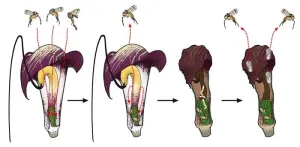(Press-News.org) PITTSBURGH, Feb. 19, 2024 – University of Pittsburgh School of Medicine researchers discovered a molecular mechanism by which excessive dietary protein could increase atherosclerosis risk. The findings were published in Nature Metabolism today.
The study, which combined small human trials with experiments in mice and cells in a Petri dish, showed that consuming over 22% of dietary calories from protein can lead to increased activation of immune cells that play a role in atherosclerotic plaque formation, driving the disease risk. Furthermore, the scientists showed that one amino acid – leucine – seems to have a disproportionate role in driving the pathological pathways linked to atherosclerosis, or stiff, hardened arteries.
“Our study shows that dialing up your protein intake in pursuit of better metabolic health is not a panacea. You could be doing real damage to your arteries,” said senior and co-corresponding author Babak Razani, M.D., Ph.D., professor of cardiology at Pitt. “Our hope is that this research starts a conversation about ways of modifying diets in a precise manner that can influence body function at a molecular level and dampen disease risks.”
According to a survey of an average American diet over the last decade, Americans generally consume a lot of protein, mostly from animal sources. Further, nearly a quarter of the population receives over 22% of all daily calories from protein alone.
That trend is likely driven by the popular idea that dietary protein is essential to healthy living, says Razani. But his and other groups have shown that overreliance on protein may not be such a good thing for long-term health.
Following their 2020 research, in which Razani’s laboratory first showed that excess dietary protein increases atherosclerosis risk in mice, his next study in collaboration with Bettina Mittendorfer, Ph.D., a metabolism expert at the University of Missouri, Columbia, delved deeper into the potential mechanism and its relevance to the human body.
To arrive at the answer, Razani’s laboratory, led by first-authors Xiangyu Zhang, Ph.D., and Divya Kapoor, M.D., teamed up with Mittendorfer’s group to combine their expertise in cellular biology and metabolism and perform a series of experiments across various models – from cells to mice to humans.
“We have shown in our mechanistic studies that amino acids, which are really the building blocks of the protein, can trigger disease through specific signaling mechanisms and then also alter the metabolism of these cells,” Mittendorfer said. “For instance, small immune cells in the vasculature called macrophages can trigger the development of atherosclerosis.”
Based on initial experiments in healthy human subjects to determine the timeline of immune cell activation following ingestion of protein-enriched meals, the researchers simulated similar conditions in mice and in human macrophages, immune cells that are shown to be particularly sensitive to amino acids derived from protein.
Their work showed that consuming more than 22% of daily dietary calories through protein can negatively affect macrophages that are responsible for clearing out cellular debris, leading to the accumulation of a “graveyard” of those cells inside the vessel walls and worsening of atherosclerotic plaques overtime. Interestingly, the analysis of circulating amino acids showed that leucine – an amino acid enriched in animal-derived foods like beef, eggs and milk – is primarily responsible for abnormal macrophage activation and atherosclerosis risk, suggesting a potential avenue for further research on personalized diet modification, or “precision nutrition.”
Razani is careful to note that many questions remain to be answered, mainly: What happens when a person consumes between 15% of daily calories from protein as recommended by the USDA and 22% of daily calories from protein, and if there is a ‘sweet spot’ for maximizing the benefits of protein – such as muscle gain – while avoiding kick-starting a molecular cascade of damaging events leading to cardiovascular disease.
The findings are particularly relevant in hospital settings, where nutritionists often recommend protein-rich foods for the sickest patients to preserve muscle mass and strength.
“Perhaps blindly increasing protein load is wrong,” Razani said. “Instead, it’s important to look at the diet as a whole and suggest balanced meals that won’t inadvertently exacerbate cardiovascular conditions, especially in people at risk of heart disease and vessel disorders.”
Razani also notes that these findings suggest differences in leucine levels between diets enriched in plant and animal protein might explain the differences in their effect on cardiovascular and metabolic health. “The potential for this type of mechanistic research to inform future dietary guidelines is quite exciting,” he said.
Additional authors of the study are Yu-Sheng Yeh, Ph.D., also from Pitt; Alan Fappi, Ph.D. and Vasavi Shabrish, Ph.D., both of the University of Missouri, Columbia; Se-Jin Jeong, Ph.D., Jeremiah Stitham, M.D., Ph.D., Ismail Sergin, Ph.D., Eman Yousif, M.D., Astrid Rodriguez-Velez, Ph.D., Arick Park, M.D., Ph.D., Joel Schilling, M.D., Ph.D., Marco Sardiello, Ph.D., Abhinav Diwan, M.D., Nathan Stitziel, M.D., Ph.D., Ali Javaheri, M.D., Ph.D., Irfan Lodhi, Ph.D., and Jaehyung Cho, Ph.D., all of Washington University School of Medicine, St. Louis; Arif Yurdagul Jr, Ph.D., and Oren Rom, Ph.D., both of the Louisiana State University Health Sciences Center; and Slava Epelman, M.D., Ph.D., of the University of Toronto.
END
Eating too much protein is bad for your arteries, and this amino acid is to blame
2024-02-19
ELSE PRESS RELEASES FROM THIS DATE:
Researchers optimize genetic tests for diverse populations to tackle health disparities
2024-02-19
To prevent an emerging genomic technology from contributing to health disparities, a scientific team funded by the National Institutes of Health has devised new ways to improve a genetic testing method called a polygenic risk score. Since polygenic risk scores have not been effective for all populations, the researchers recalibrated these genetic tests using ancestrally diverse genomic data. As reported in Nature Medicine, the optimized tests provide a more accurate assessment of disease risk across diverse populations.
Genetic tests look at the small differences between individuals’ ...
Cleveland Clinic-led study discovers link between high levels of niacin - a common b vitamin - and heart disease
2024-02-19
February 19, 2024, Cleveland: Cleveland Clinic researchers have identified a new pathway that contributes to cardiovascular disease associated with high levels of niacin, a common B vitamin previously recommended to lower cholesterol.
The team, led by Stanley Hazen, M.D., Ph.D., discovered a link between 4PY, a breakdown product from excess niacin, and heart disease. Higher circulating levels of 4PY were strongly associated with development of heart attack, stroke and other adverse cardiac events in large-scale clinical studies. The researchers also showed in preclinical studies that 4PY directly triggers vascular ...
Neighborhood segregation and access to live donor kidney transplantation
2024-02-19
About The Study: Segregated residential and transplant center neighborhoods likely serve as a mechanism of structural racism, contributing to persistent racial disparities in access to live donor kidney transplantation. To promote equitable access, studies should assess targeted interventions (e.g., community outreach clinics) to improve support for potential candidates and donors and ultimately mitigate the effects of segregation.
Authors: Mara A. McAdams-DeMarco, Ph.D., of the New York University Grossman School of Medicine in New York, is the corresponding author.
To access the embargoed study: Visit our For The Media website at this link ...
Age-related risk of serious fall events and opioid analgesic use
2024-02-19
About The Study: The results of this study of 3.2 million people who initiated prescription opioid treatment suggest that prescription opioids were associated with increased risk of serious fall events among adults of all ages, with individuals 85 years or older at greatest risk. These risks should be considered when prescribing opioids, particularly for individuals with preexisting risk factors or when opioids are prescribed at higher doses. Targeted falls prevention efforts may be most effective within the first month following opioid initiation.
Authors: Natasa Gisev, Ph.D., of the National Drug and Alcohol Research Centre, UNSW ...
Genetic risk prediction for 10 chronic diseases moves closer to the clinic
2024-02-19
By analyzing millions of small genetic differences across a person’s genome, researchers can calculate a polygenic risk score to estimate someone’s lifetime odds of developing a certain disease. Over the past decade, scientists have developed these risk scores for dozens of diseases, including heart disease, kidney disease, diabetes, and cancer, with the hope that patients could one day use this information to lower any heightened risk of disease. But determining whether such tests work effectively across all populations, and how they can guide clinical decision-making, has been a challenge.
Now, ...
Newly discovered genetic markers help pinpoint diabetes risks, complications
2024-02-19
In the largest genome-wide association study to date on Type 2 diabetes, a team of international researchers, co-led by a University of Massachusetts Amherst genetic epidemiologist, has located 1,289 genetic markers associated with Type 2 diabetes (145 of which are newly identified) and generated risk scores for diabetes complications.
In research published Monday, Feb. 19 in the journal Nature that advances understanding into the inheritability of Type 2 diabetes, the scientists used cutting-edge ...
One step forward, no steps back: new study advances understanding of dopamine’s role in movement
2024-02-19
Dopamine, a chemical messenger in the brain, is mostly known for its role in how we experience pleasure and reward. However, new research from the Champalimaud Foundation (CF) shifts the spotlight towards dopamine’s critical involvement in movement, with implications for our understanding and treatment of symptoms in Parkinson’s Disease (PD).
Imagine the act of walking. It’s something most able-bodied people do without a second thought. Yet it is actually a complex process involving various ...
Pollinator's death trap turns into nursery
2024-02-19
In a group of plants that is famous for luring its pollinators into a death trap, one species offers its flowers as a nursery in exchange. The Kobe University discovery blurs the line between mutualism and parasitism and sheds light on the evolution of complex plant-insect interactions.
Many plants rely on animals for pollination and most offer rewards for the service. Some plants, however, deceive their pollinators, and a famous example is the genus Arisaema. “It is famous as the only plant that achieves pollination at the expense of the pollinator's life,” says Kobe University biologist SUETSUGU Kenji, who is an expert on plant pollination ecology. The plant uses ...
Studies find flu vaccines were effective in 2022-2023 flu season
2024-02-19
The prospect of the worrisome triple threat of COVID, RSV and flu was assuaged last year by the effectiveness of flu vaccines. Two recent studies from the Centers for Disease Control and Prevention’s VISION Network have found that flu vaccines were effective for all ages against both moderate and severe flu in the U.S. during the 2022-2023 flu season.
Both the pediatric and adult VISION Network studies analyzed flu-associated emergency department (E.D.)/urgent care visits (indicative of moderate disease) and hospitalization (indicative of severe disease) from October 2022 through March 2023, a flu season in which far fewer individuals were social distancing or ...
Second year of Cal Poly astronomy fellowship to examine high-energy particle jets near supermassive black holes
2024-02-19
February 16, 2024
Contact: Nick Wilson
805-235-8008; nwilso28@calpoly.edu
Second Year of Cal Poly Astronomy Fellowship to Examine High-Energy Particle Jets Near Supermassive Black Holes
SAN LUIS OBISPO — In the second year of the Astronomy Faculty Research Fellowship in Cal Poly’s Bailey College of Science and Mathematics, a research team will study extremely high-energy photons emitted by the extreme environment found near mega-sized black holes.
The fellowship was ...





